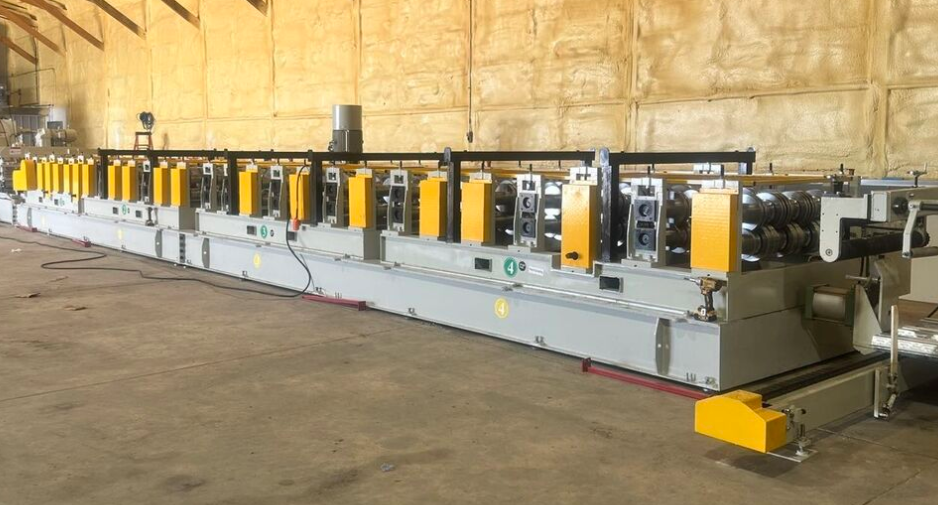Roof Deck Roll Forming Machine: Comprehensive Guide for Buyers and Users
Roof deck roll forming machines play a vital role in producing robust decking solutions for roofing and flooring systems in construction. These machines are built to shape metal coils into high-quality profiles that add structural integrity and support to a building’s framework.
1. Machine Overview
Roof deck roll forming machines are designed to produce roofing and structural decking profiles with precision and speed. These machines transform metal coils into corrugated or ribbed sheets, which can be used in roofing, mezzanine floors, and even steel buildings. Known for their durability and versatility, roof deck roll forming machines are widely adopted in the construction industry to produce cost-effective, long-lasting decking.
2. Key Specifications
- Roller Materials: The rollers are typically made of hardened steel or chromium-coated steel to withstand the pressures of forming heavy-duty decking materials, ensuring longevity and minimal wear.
- Punching and Notching: These machines often include punching and notching systems that create precise openings or holes within the profile, enabling easy assembly and installation on construction sites.
- Servo Motors: Servo motors enable accurate control over the machine’s operation, allowing for consistent production at high speeds. This precision is crucial when working with varied material thicknesses.
- Hydraulic Cutting Systems: Hydraulic cutting systems provide clean, precise cuts that help maintain the structural integrity of each profile. These systems are fast and effective, especially for large-scale production.
- Frame Size: The frame size of roof deck roll forming machines can vary, but it’s typically robust to accommodate the high stress and torque involved in forming thicker gauge materials.
- Motors & PLC System: Powerful motors drive the rollers, while an advanced PLC (Programmable Logic Controller) system offers automated control, enhancing efficiency and ease of operation.
- Machine Speed: These machines can achieve high speeds, often producing up to 40 meters of decking per minute, which is ideal for large-scale production needs.
- Safety Guards & Enclosures: Safety is paramount in industrial machinery. Roof deck roll forming machines come equipped with guards and enclosures to protect operators, adhering to strict safety standards.
3. Profile Description
- Materials: Common materials include galvanized steel, aluminum, and stainless steel. The material choice influences corrosion resistance and load-bearing capacity.
- Sizes & Material Gauge: Profiles vary in width and gauge; common gauges are between 18 and 24, which provide the necessary strength without adding excessive weight.
- Market Demand: The construction industry has a high demand for these profiles due to their cost-efficiency and durability, particularly in commercial, industrial, and infrastructure projects.
- Industries Served: Primarily, roof deck profiles are used in construction, infrastructure, and industrial sectors where structural support and durability are essential.
- Popular Countries: Roof deck roll forming machines are particularly popular in countries like the USA, China, and Canada. This is due to strong construction and infrastructure development in these regions, along with specific building codes that favor steel decking.
4. Optional Extras
- Stackers: Stackers streamline production by organizing profiles as they are produced, saving time and space.
- Remote PLC Systems: Remote control and monitoring capabilities enhance operational convenience and troubleshooting.
- Coil Car Tippers, Uncoilers, and Recoilers: These additions ensure efficient coil handling, crucial for large-scale operations.
- Automatic Stackers & Leveling Systems: These features automate profile stacking and material leveling, reducing manual labor and increasing productivity.
- Coil Handling Systems: Coil handling systems simplify the movement and storage of heavy coils, enhancing safety and workflow.
5. Machine Pricing
Roof deck roll forming machines are available in a range of prices:
- Entry-Level: Basic models start at lower price points, ideal for smaller businesses or companies with modest production needs.
- Mid-Range: These machines offer additional features, like automated stackers and enhanced control systems, suitable for medium-sized production facilities.
- High-End: Top-tier machines come with full automation, advanced PLCs, and robust construction to handle the demands of high-volume production. These models are more expensive but provide a higher ROI in large-scale operations.
6. Setup and Installation
Setting up a roof deck roll forming machine requires careful planning:
- Initial Setup: Ensure adequate space and power supply based on the machine’s specifications.
- Installation: Position the machine on a stable surface, and connect it to the necessary power and control systems.
- Calibration: Calibrate the PLC to match the desired profile dimensions and production speed.
A professional installation team can help optimize setup and minimize downtime.
7. Maintenance Requirements
- Routine Maintenance: Daily checks for any misalignments or loose bolts, weekly lubrication of rollers and other moving parts, and monthly inspections of the PLC and hydraulic systems.
- Troubleshooting Common Issues: Operators should be trained to troubleshoot issues like inconsistent profile formation or hydraulic leaks, ensuring uninterrupted production.
- Service Intervals: Regular servicing, ideally every 6 months, can extend the machine’s life and maintain optimal performance.
8. Frequently Asked Questions (FAQ)
- How long does it take to install a roof deck roll forming machine?
Installation typically takes 2-3 days, depending on the machine’s complexity and available infrastructure. - What’s the average lifespan of a roof deck roll forming machine?
With proper maintenance, these machines can last 10-15 years or more. - Can the machine be customized for different profile sizes?
Yes, most machines allow customization to create various profile sizes and gauges. - What safety protocols are required?
Operators should follow safety guidelines, including wearing protective gear and using safety guards, to prevent accidents.
Conclusion
Investing in a roof deck roll forming machine can significantly enhance your production capabilities in the construction industry. Understanding the specifications, options, and maintenance requirements can help you make a well-informed decision. Whether you’re looking to expand production or optimize efficiency, this machine offers the versatility and durability required in today’s market.




